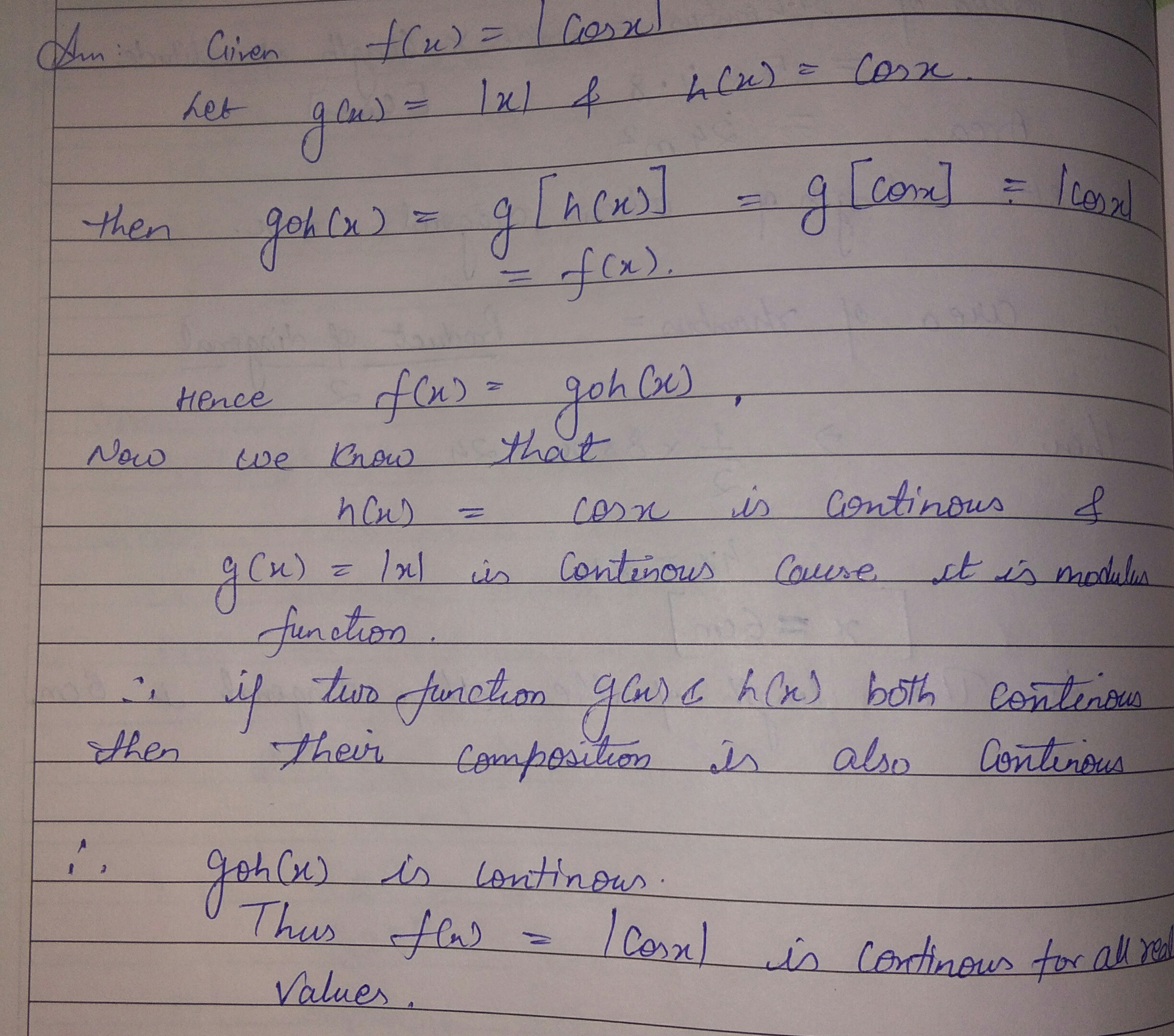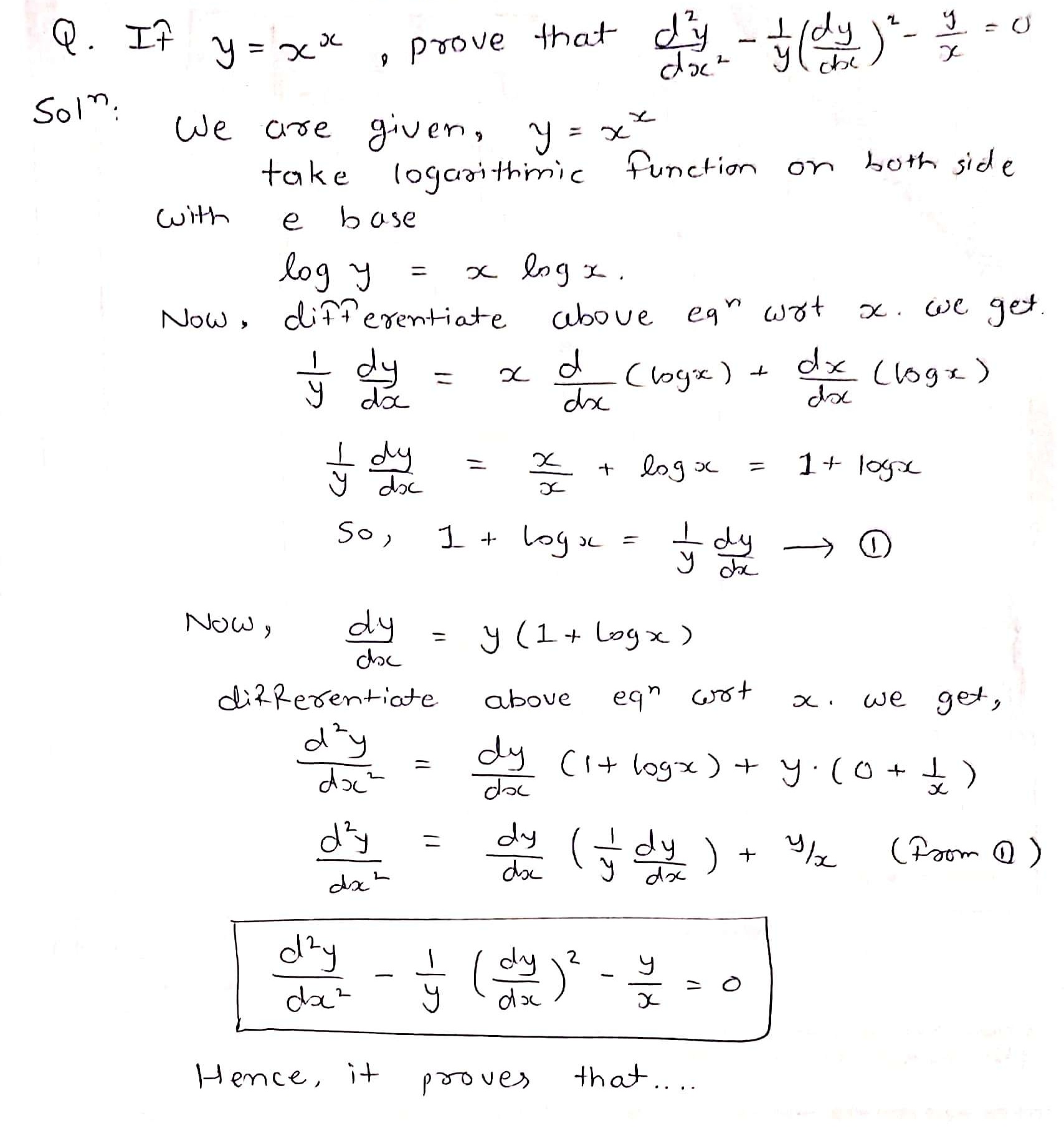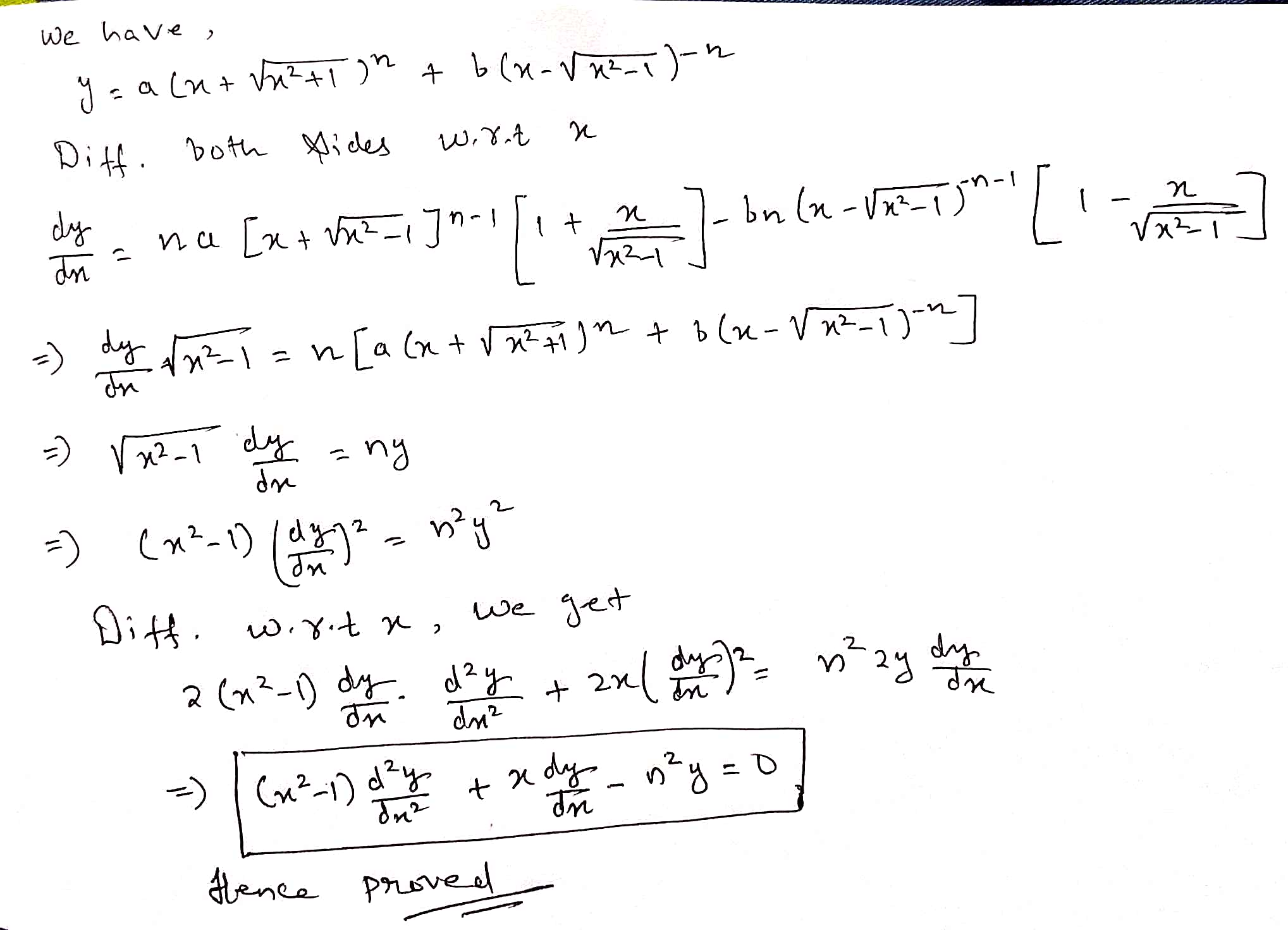Continuity And Differentiability - Class 12 Engineering Maths - Extra Questions
If, is continuous at $$x = 2$$, find the value of $$k$$.$$f(x) = \begin{cases} \dfrac{x^3 + x^2 - 16x + 20}{(x-2)^2},& x \neq 2\\ k,&x = 2 \end{cases}$$
Check the continuity of the function $$f ( x ) = \left\{ \begin{array} { l l } { \frac { | x | } { x } , } & { x \neq 0 } \\ { 0 , } & { x = 0 } \end{array} \right. \text { at } x = 0$$
Discuss the continuity of the function $$f$$, where $$f$$ is defined by
$$f(x) =$$ $$\begin{cases} 3,\ if\ 0 \le x \le 1 \\ 4,\ if\ 1< x < 3 \\ 5,\ if\ 3 \le x \le 10 \end{cases}$$
Find the values of $$a$$ and $$b$$ so that the function, $$f(x)=\begin{cases} \cfrac { 1-\sin ^{ 2 }{ x } }{ 3\cos ^{ 2 }{ x } } ,\quad x<\pi /2 \\ a,\quad \quad x=\pi /2 \\ \cfrac { b\left( 1-\sin { x } \right) }{ { \left( \pi -2x \right) }^{ 2 } } ,\quad \quad x>\pi /2 \end{cases}$$ is continuous.
Differentiate $$\sin^{-1}\left [\dfrac {2^{x + 1}.3^{x}}{1 + (36)^{x}}\right ]$$ w.r.t $$x$$.
Find the relationship between $$a$$ and $$b$$ so that the function $$f$$ defined by
$$f(x) = \left\{\begin{matrix} ax + 1,&if\ x\leq 3 \\bx + 3, & if\ x > 3\end{matrix}\right.$$
is continuous at $$x = 3$$.
Using the definition, show that the function.
$$\displaystyle\, f(x) = x\sin\, (1/x)$$ if $$x \neq 0, \, 0$$ if $$x = 0$$ is continuous at the point $$x = 0$$
Differentiate the following functions w.r.t $$x$$
$$(i) \cos^{-1} ( \dfrac{2x}{1+x^2})$$
$$(ii) \sin^{-1} (2x\sqrt{1-x^2})$$
Show that the function defined by $$f(x)=|\cos x|$$ is a continuous function.
If $$y=\tan x$$, prove that $$y_{2}=2yy_{1}$$.
If $$y=\tan^{-1}x$$, find $$\dfrac{d^2y}{dx^2}$$ in terms of y alone.
$$f(x)$$ = $$\Bigg [\begin{array} d5, & x\leq 2 \\ ax+b, & 2 < x < 10 \\ 21, & x > 10 \end{array}$$
If $$f(3)=5\\f(5)=3$$Find $$a,b$$
Differentiate: $$y = 8 \sin x \cos x $$ w.r.t $$x$$
If $$y=x^x,$$ prove that $$\dfrac{d^2y}{dx^2}-\dfrac{1}{y}(\dfrac{dy}{dx})^2-\dfrac{y}{x}=0$$
Write the value of the derivative of $$f(x)=|x-1|+|x-3|$$ at $$x=2$$.
Discuss the continuity and differentiability of the function $$f(x)=|x|+|x-1|$$ in the interval $$(-1, 2)$$.
Prove that the greatest integer function by $$f(x)=[x], 0<x<3$$ is not differentiable at $$x=1$$.
Prove that the greatest integer function by $$f(x)=[x], 0<x<3$$ is not differentiable at $$x=2$$.
Show that the function $$f(x)=x-[x]$$, where $$[\cdot]$$ denotes the greatest integer function is discontinuous at all integral points.
Show that $$f(x)=|x-3|$$ is continuous but not differentiable at $$x=3$$.
Differentiate the following functions with respect to $$x$$:
If $$y=\cos^{-1}(2x)+2\cos^{-1} \sqrt {1-4x^2},0 < x <\dfrac {1}{2}$$, find $$\dfrac {dy}{dx}$$.
Differentiate the following functions with respect to $$x$$:
If $$y=\sin^{-1}\left (\dfrac {2x}{1+x^2}\right)+\sec^{-1}\left (\dfrac {1+x^2}{1-x^2}\right), 0 < x < 1$$, prove that $$\dfrac {dy}{dx}=\dfrac {4}{1+x^2}$$
Differentiate the following functions with respect to $$x$$:
If $$y=\cot^{-1}\left\{\dfrac {\sqrt {1+\sin x} +\sqrt {1-\sin x}}{\sqrt {1+\sin x} -\sqrt {1-\sin x}}\right\}$$, $$0<x<\dfrac{\pi}2$$,show that $$\dfrac {dy}{dx}$$ is independent of $$x$$.
If the derivatives of $$\tan^{-1}(a+bx )$$ takes the value $$1$$ at $$x=0$$, prove that $$1+a^2 =b$$
If $$y=(\sin^{-1}x)^{2}$$, then prove that $$(1-x^{2})y_{2}-xy_{1}-2=0$$.
Find $$\dfrac {dy}{dx}$$ if $$y=(\sin x)^x +\sin^{-1}\sqrt x$$
If $$y= \sin (\sin\, x),$$ then prove that $$\dfrac{d^{2}y}{dx^{2}}+\tan\, x\dfrac{dy}{dx}+ y\, \cos^{2}x=0$$.
If $$y=e^{\tan^{-1}x}$$, then prove that $$\left ( 1+x^{2} \right )y_{2}+(2x-1)y_{1}=0$$.
If $$y=3 \cos (log\, x)+4\sin (\log\, x),$$ prove that $$x^{2}y_{2}+xy_{1}+y=0$$.
If $$y= \text{cosec}^{-1}x, x > 1$$, then show that $$x(x^{2}-1)\dfrac{d^{2}y}{dx^{2}}+(2x^{2}-1)\dfrac{dy}{dx}=0$$.
Show that $$f(x)=(x-1){e}^{x}+1$$ is an increasing function for all $$x> 0$$
If $$y= (cot^{-1}x)^{2}$$, prove that $$y_{2}(x^{2}+1)^{2}+2x(x^{2}+1)y_{1}=2$$.
Find $$\dfrac{d^{2}y}{dx^{2}}$$, where $$y= \log\left ( \dfrac{x^{2}}{e^{2}} \right )$$.
If $$y=\left \{ log(x+\sqrt{x^{2}+1}) \right \}^{2}$$, then show that $$(1+x^{2})\dfrac{d^{2}y}{dx^{2}}+x\dfrac{dy}{dx}=2.$$
Find the differential equation of the following.
$$\tan^{-1} \left(\dfrac{1 - \cos x}{\sin x} \right)$$
If $$y=e^{2x}(ax+b)$$, show that $$y_{2}-4y_{1}+4y=0$$.
The left hand derivative of $$f(x)=[x] sin \pi x$$ at $$x=k$$ is?(Where k is an integer and [x]=greatest integer $$\leq x$$)
Differentiate $$\sin { { h }^{ -1 }\left( \cfrac { 1 }{ x } \right) } $$ with respect to $$x(x> 0)$$
If $$x={ acos }^{ 3 }\theta $$ and $$y={ asin }^{ 3 }\theta $$, prove that $$\dfrac { dy }{ dx } =\sqrt [ 3 ]{ \dfrac { y }{ x } } $$
If $$x=\sin t,y=\sin k t$$,then show that $$\left(1-{x}^{2}\right)\dfrac{{d}^{2}y}{d{x}^{2}}-x\dfrac{dy}{dx}-ky=0$$
Prove that $$f(x)=\sin x+\sqrt{3}\cos x$$ has maximum value at $$x=\dfrac{\pi}{6}$$.
If $$ y=a \left \{ x+\sqrt{x^2+1} \right \}^{n}+ b \left \{ x-\sqrt{x^2+1} \right \}^{-n}$$, then prove that $$ (x^2-1)\dfrac{d^2y}{dx^2}+x\dfrac{dy}{dx}- n^2 y = 0.$$
Class 12 Engineering Maths Extra Questions
- Continuity And Differentiability Extra Questions
- Determinants Extra Questions
- Differential Equations Extra Questions
- Integrals Extra Questions
- Inverse Trigonometric Functions Extra Questions
- Relations And Functions Extra Questions
- Three Dimensional Geometry Extra Questions
- Vector Algebra Extra Questions



